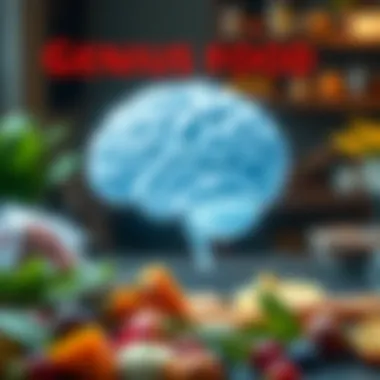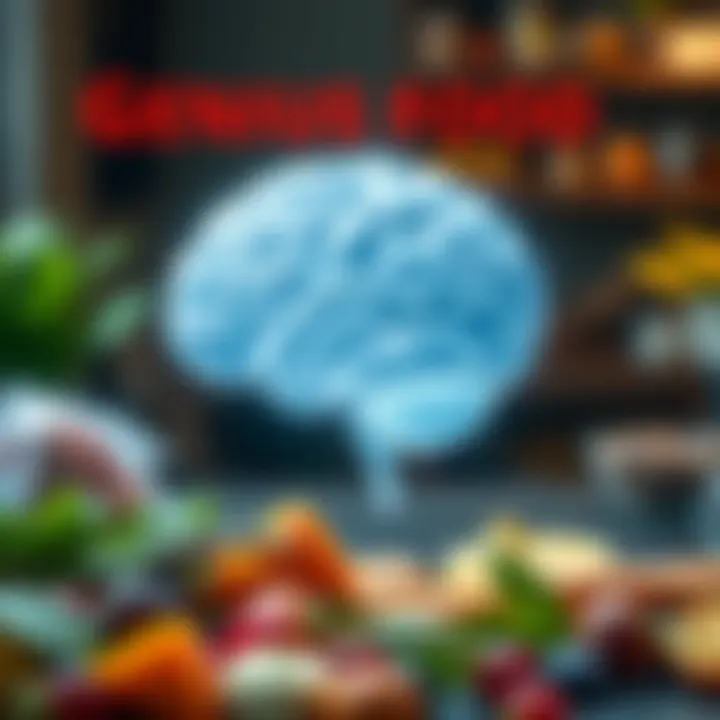Genius Foods for Enhanced Brain Health


Intro
In today's fast-paced world, a sharp mind is more essential than ever. While we often focus on exercise and sleep as diets for the body, the implications of what we eat can hold just as much weight when it comes to cognitive health. The term "genius foods" refers to specific foods linked with enhancing brain function, but, as anyone venturing down this path might discover, it's not just about throwing the latest superfood into your smoothie.
Understanding how these foods are integral to overall cognitive performance invites an exploration beyond the kitchen. It involves looking at science – specifically, how nutrients interact with our brain chemistry, influencing mood, memory, and even decision-making.
This article serves as a compass, guiding you through the landscape of these foods – from nuts and seeds to fats and berries. Our goal is to help readers, including students, educators, and entrepreneurs, discern which of these dietary choices might best support the pursuit of mental acuity and clarity.
Each section will unveil insights into the nutritional specifics behind these choices, practical tips to incorporate them into everyday routines, and what the research says about their effects. Dive into this exploration, and you may just find that the key to unlocking your cognitive potential lies within your next meal.
Defining Genius Foods
The notion of genius foods transcends mere dietary choices; it encapsulates a spectrum of nutritional elements that are believed to bolster cognitive function and brain health. In this article, we will dissect what genius foods are, their significance in how we approach our daily nourishment, and how they can serve as a foundation for enhancing mental acuity. The concept marries delicious eating with scientific inquiry, merging culinary delights with the pursuit of better brain performance.
Understanding the Concept
To grasp the significance of genius foods, one must appreciate how what we consume directly influences our cognitive capacity. These foods often come packed with vitamins, minerals, and healthy fats that support neural health. Think about it like investing in high-quality fuel for a premium engine; the better the fuel, the better the performance.
Genius foods include a range of items like fatty fish, blueberries, leafy greens, nuts, and whole grains, each contributing unique benefits to brain function. For instance, fatty fish are rich in omega-3 fatty acids, which have been linked to improved memory and mood regulation.
Additionally, the inclusion of something as simple as berries in the diet can provide a hefty dose of antioxidants, which protect the brain from oxidative stress.
In practical terms, understanding genius foods means rethinking how we perceive our meals, not just as sustenance, but as a means to enhance our cognitive potential and overall well-being.
The Science Behind Brain Health
The relationship between nutrition and brain health is a well-documented area of scientific research. It turns out that different nutrients play crucial roles in brain development and its maintenance over time. For example, vitamins like B6, B12, and folate have been shown to lower homocysteine levels, a chemical linked to increased cognitive decline, while antioxidants found in various fruits and vegetables can reduce inflammation.
Moreover, it is essential to recognize how our brains function.”
- The brain relies heavily on glucose and requires healthy fats to build cells.
- Neurotransmitters—chemicals released in the brain—require specific amino acids for synthesis, which are abundantly sourced from foods like lean meats, dairy, and legumes.
- Furthermore, polyunsaturated fatty acids, predominantly found in fish, promote synaptic plasticity, which is pivotal for learning and memory.
The interplay of these factors illustrates that our eating habits are not merely a matter of taste but are instrumental in shaping our mental capabilities over the long haul. With a more thoughtful approach to what we put on our plates, we can help ensure our minds operate at their peak.
"The food you eat can be either the safest and most powerful form of medicine or the slowest form of poison."
This quote by Ann Wigmore resonates with the concept of genius foods perfectly, urging us to make wise dietary choices that promote our brain health and cognitive longevity. Recognizing genius foods as vital allies in mental clarity could pave powerful paths to enhanced productivity and inspiration.
In summary, defining genius foods provides a lens through which we can view our eating habits as crucial elements in supporting brain health. It serves as a compelling call to action for students, educators, entrepreneurs, and lifelong learners to consider how their food choices impact their cognitive function and overall mental well-being.
Types of Genius Foods
Understanding the landscape of genius foods is crucial because they offer a sleuth of benefits for optimizing cognitive function. These foods are not just fancy buzzwords; they are nutritional powerhouses that support brain health, enhance mental clarity, and can even stave off cognitive decline. By incorporating these foods into your diet, you can nurture your mind just the way you would nourish your body. It's about creating a balanced plate that serves a higher purpose—fostering mental sharpness and sustaining long-term brain health.
Fatty Fish
Omega-3 Fatty Acids and Cognitive Function
Fatty fish like salmon, mackerel, and sardines carry a heavyweight nutritional profile that sets them apart. The star here is omega-3 fatty acids, crucial for brain development and functioning. These fats directly contribute to building brain cell membranes and play a pivotal role in improving communication between neurons. Notably, the consumption of omega-3 fatty acids has been linked to reducing conditions such as depression, anxiety, and dementia. Its primary characteristic? Anti-inflammatory properties that protect neuronal health. You’ll want to include these fatty fish in your meals to optimize their cognitive boosting benefits.


Sources of High-Quality Fish
When it comes to delightful dishes featuring fish, quality is key. Many people might not know that wild-caught fish generally boast higher omega-3 levels compared to farmed varieties. Additionally, sourcing sustainable fish is increasingly becoming a priority for health-conscious eaters as well as the environmentally aware. A unique feature here is the abundance of options in culinary preparations, from grilled fillets to savory fish stews. The only downside? Fish can be pricey and may not fit everyone’s budget.
Berries
The Antioxidant Power
Berries like blueberries, strawberries, and blackberries pack a serious antioxidant punch. Antioxidants are known for combating oxidative stress, which is implicated in cognitive decline. The high concentration of flavonoids found in these fruits is thought to improve memory and cognitive performance. Their notable characteristic is that they not only work wonders for the brain but also support overall health. Including berries in your diet will give you a protective shield against the aging process, and you’ll be hard-pressed to find an easier-to-consume snack!
Best Varieties for Brain Health
When it comes to brain health, blueberries often take center stage. Research suggests they might enhance communication between brain cells and promote neurogenesis—the creation of new neurons. Not forgetting strawberries or blackberries, both hold unique benefits that are well worth indulging in. Their standout trait is the versatility in meals and desserts, whether you toss them in a smoothie or serve them fresh. The potential drawbacks? Some berries might be seasonal or less accessible year-round in certain areas.
Leafy Greens
Nutrients Essential for Mental Clarity
Leafy greens, such as spinach, kale, and collards, are like the green superheroes of the food world. They come jam-packed with essential vitamins and minerals like vitamin K, folate, and beta carotene, which research indicates can enhance cognitive ability. Their primary benefit lies in their ability to support brain function by reducing oxidative stress. When included regularly in your diet, they can cultivate a clearer mind. Plus, they're easy to add to salads or smoothies!
Including Greens in Your Diet
Many people struggle to incorporate greens regularly, but the key is to get creative. Adding spinach to breakfast eggs or kale to a hearty soup can do the trick. The versatility of leafy greens is their standout feature. However, if you never venture beyond traditional salads, you might be missing out on vibrant flavors and textures. Remember, experimentation can keep meals interesting, while also fueling your cognitive health.
Nuts and Seeds
Vitamin E and Cognitive Preservation
Nuts and seeds are often hailed as snack-time champions—pop them in your mouth, and you’re set! But they also contain high levels of vitamin E, known for protecting the brain against oxidative stress. This vitamin is essential for cognitive preservation as we age. The key takeaway here? They’re not just tasty; they also serve a notable purpose. Including a small handful of these crunchy powerhouses in your day can make a tangible difference.
Which Nuts Provide the Most Benefit
Many might wonder which nuts are the most beneficial to include in their diet. Walnuts, for instance, are often considered the best due to their high DHA content. However, almonds, cashews, and hazelnuts equally provide vitamin E and healthy fats. Each variety has its unique zest, be it in taste or texture! But do be cautious with portion sizes, as it’s easy to overindulge in these energy-dense snacks.
Whole Grains
The Role of Fiber and Sustained Energy
Whole grains, including oats, brown rice, and quinoa, are pivotal for brain health. They provide fiber, which helps regulate blood sugar levels and keeps energy consistent. This stability is essential to maintain mental clarity throughout the day. A key characteristic worth noting is the diverse range of options that make them easy to incorporate. Whether in a breakfast bowl or a hearty pilaf, whole grains are an effortless way to fortify your brain.
Choosing the Right Whole Grains
When selecting whole grains, look for products labeled as whole grain or whole wheat. The unique feature here is their greater nutrient density compared to their refined cousins. They contain more vitamins, minerals, and antioxidants, which can significantly help maintain brain health. Be aware, though, that not all whole grain products are created equal; some might be laden with sugars or preservatives.
Avocado
Healthy Fats and Blood Flow
Avocados are unique as they are brimming with healthy monounsaturated fats, which can facilitate blood flow to the brain. Improved circulation is linked with better cognitive function, and avocados are one of the best sources of these fats. Their standout feature is that they offer a creamy texture, making them an ideal choice for a range of dishes, from salads to smoothies. The only downside? Some might find them on the pricier side and harder to fit into a budget-friendly meal prep.


How to Incorporate Avocado in Meals
Incorporating avocados into meals is easier than one might think. Try slicing an avocado on toast, blending it into hummus, or mixing it into a fresh salad. The taste and texture elevate any dish, pushing your meals to the next level. Yet, consume in moderation, as their high-calorie content can sneak up on you.
Dark Chocolate
Flavonoids and Brain Function
Dark chocolate isn’t just a guilty pleasure; it’s a potential brain booster. Rich in flavonoids, dark chocolate can enhance blood flow to the brain, which improves cognitive function. This sweet treat is a beneficial choice in moderation, posing unique advantages such as increased focus and reduced fatigue. But remember, not all chocolate is created equal—choose varieties with higher cocoa content for maximum benefits.
Moderation and Selection Tips
When indulging in dark chocolate, moderation is key. Aim for a small square or two rather than a hefty bar. Selecting high-quality options that contain 70% cocoa or more maximizes the flavonoid content. The proper balance allows one to enjoy the mental perks without overindulging in sugars and fats. Regularly checking labels is a simple but effective way to choose wisely.
Mechanisms of Action
Understanding how genius foods influence our cognitive function requires a closer look at their mechanisms of action. This section explores the fundamental processes by which these foods support brain health and performance, revealing intricate connections between nutrition and neural function.
Nutrient Interactions
Genius foods are packed with a variety of nutrients that don't just act in isolation; they often interact in complex ways that enhance their impact on cognitive function. For instance, the combination of vitamin E from nuts and omega-3 fatty acids from fatty fish can magnify their respective benefits. These nutrients play crucial roles in protecting cell membranes and facilitating cell communication in the brain.
Moreover, certain vitamins and minerals can also promote the absorption and bioavailability of other nutrients. For example, vitamin C can improve the uptake of iron from plant sources, which is essential for maintaining energy levels and optimal brain oxygenation. By understanding these interactions, individuals can make more informed choices in meal planning, ensuring they consume a balanced mix of genius foods that work synergistically.
Impact on Neurotransmitters
Neurotransmitters are pivotal to brain function, acting as messengers within the nervous system. Foods rich in specific amino acids can ultimately shape the production of these neurotransmitters. For instance, tryptophan, found in turkey and bananas, is a precursor to serotonin, often referred to as the
Implementing Genius Foods into Your Diet
Incorporating genius foods into your diet isn't just a trend; it's a pathway to enhance your cognitive abilities and maintain overall brain health. This section explores how to effectively bring these nutritious options into your daily meals and routines. The key is to make these foods accessible and enjoyable while keeping in mind the right combinations and strategies that can amplify their benefits.
Meal Planning Strategies
A solid plan can make all the difference when it comes to meal preparation. Start by including a variety of genius foods in your grocery list. Prioritize whole foods, like fresh fruits and vegetables, healthy fats from nuts, and options like fatty fish. Here are some practical tips:
- Inventory Check: Regularly check your kitchen to see what genius foods you already have. This helps avoid duplicate purchases and promotes creativity in using what you have.
- Weekly Themes: Dedicate each week to a specific food group, for instance, a week focused on berries. This encourages experimentation and helps you discover new recipes while maximizing the benefits of each food type.
- Batch Cooking: Spend a couple of hours on the weekend preparing meals for the week ahead. Incorporating bulk ingredients like whole grains and legumes saves time and keeps you on track.
The goal is to set the foundation for consistent healthy eating, making it easier to include genius foods regularly.
Recipes Featuring Genius Foods
Let's spice up your menu! Here are some engaging recipe ideas that feature genius foods, designed to tickle the taste buds while providing essential nutrients:
- Avocado Toast with Walnuts and Blueberries:
- Berry and Spinach Smoothie:
- Ingredients: Whole grain bread, ripe avocado, a handful of walnuts, fresh blueberries, salt, and pepper.
- Instructions: Mash the avocado and spread it on toasted bread. Top with walnuts and blueberries. Sprinkle with salt and pepper to taste.
- Ingredients: A banana, a cup of spinach, a cup of mixed berries, a tablespoon of flaxseeds, and almond milk.
- Instructions: Blend all ingredients until smooth. Pour into a glass and enjoy the boost of antioxidants and healthy fats.


These meals not only taste good but also promote brain function in a tasty way.
Avoiding Common Pitfalls
As with any dietary changes, it’s easy to stumble into common traps. Here are a few pitfalls to watch out for while incorporating genius foods:
- Overcomplicating: Don't feel pressured to create elaborate, time-consuming meals. Simple is often best. A basic grilled salmon with a side of kale and quinoa can do wonders.
- Neglecting Balance: Ensure you're still eating a variety of foods. While genius foods are beneficial, neglecting other nutrients can leave gaps in your diet.
- Sticking to Favorites: Rotating your choices keeps you from getting bored and helps you capture the full spectrum of nutrients available.
Remember, making small changes consistently can lead to lasting benefits in your brain health. Just like a choir, it's the combination and variety of voices that create harmony.
With the right strategies, recipes, and conscious avoidance of common mistakes, implementing genius foods can become a seamless part of your everyday life. Each bite taken is a step toward a sharper mind.
Evaluating the Impact
Evaluating the impact of genius foods on cognitive function is crucial for understanding how our dietary choices can shape mental performance. It allows individuals to see not only immediate benefits but also long-term effects on brain health. Tracking how these foods influence everyday cognition brings many advantages, such as tailoring diets to enhance learning, memory retention, and decision-making skills. By plowing through measurable outcomes, such as improved focus or quicker recall, one can truly appreciate the evidence behind the claims that these foods pack a powerful punch.
Tracking Cognitive Performance
When diving into tracking cognitive performance, a variety of methods come to play. One might begin with self-assessments, keeping tabs on daily mental clarity or fluency while engaging in tasks. Noting changes in memory or attention levels might provide insights into how certain foods affect cognitive function on a personal level.
Additionally, one can employ cognitive tests or online platforms that specialize in brain games to evaluate performance more formally. Simple puzzles, memory games, and attention tests can serve as useful tools. As one incorporates genius foods like fatty fish or berries into the diet, results can reflect noticeable shifts in capabilities.
Moreover, consistency in tracking frequency is key. A week may not be enough to identify differences in performance, but over months, trends may emerge. These consistent evaluations give concrete evidence toward establishing a connection between diet and cognitive function.
Long-Term Study Insights
Long-term studies shine a light on the sustained effects of consuming genius foods over extended periods. Research shows that individuals who regularly include foods such as leafy greens, nuts, and whole grains in their diets exhibit a slower cognitive decline compared to those who don't. Findings from studies published in journals like the American Journal of Clinical Nutrition and Frontiers in Aging Neuroscience highlight these effects well.
Some prominent studies suggest that those following diets rich in antioxidants — like berries and dark chocolate — report better cognitive abilities as they age. Longitudinal studies indicate improvements not just in memory, but also in the overall brain function, combating age-related cognitive decline effectively.
It’s noteworthy that these insights underscore how diet acts as a preventive strategy rather than a reactive one. This positions genius foods as central players in the mental wellness toolkit, influencing cognitive longevity from the ground up.
"A well-rounded diet rich in genius foods can be as beneficial as a gym membership for your brain."
By evaluating the impact of genius foods, individuals can experience firsthand the role diet plays in fostering brain health. Engaging in both self-tracking and referencing long-term studies yields a comprehensive understanding of how nutrition influences mental function, spiraling into broader implications for those seeking to maximize their cognitive abilities.
Epilogue and Further Reading
In the realm of cognitive enhancement, understanding the significance of genius foods serves as a cornerstone. Throughout this article, we have charted a course through diverse dietary options that contribute substantially to brain health. A well-informed approach to nutrition goes beyond just daily meals; it embodies a commitment to nurturing our cognitive faculties for the long haul. Such foods, with their dense nutritional profiles, offer pathways to not only improve mental clarity but also protect against cognitive decline as we age.
Summing Up the Benefits
To bring everything into perspective, it's vital to highlight the myriad benefits these genius foods can offer:
- Enhanced Memory: Regular consumption of foods rich in omega-3s, antioxidants, and essential vitamins can bolster memory functions, making it easier to retain new information.
- Improved Mood and Focus: Nutrients like magnesium, found in nuts and seeds, play a significant role in regulating mood, which indirectly enhances focus and productivity.
- Neuroprotection: Foods such as leafy greens and dark chocolate are not just tasty but also packed with compounds that protect brain cells from oxidative stress and inflammation.
- Increased Energy Levels: Whole grains provide sustained energy levels, preventing the crashes that often hinder cognitive performance and creativity.
It's clear that adopting these nutrient-rich foods can significantly enhance one’s cognitive prowess and overall health.
Resources for Deepening Knowledge
For those looking to dive deeper into the relationship between diet and brain function, the following resources are invaluable:
- Harvard Health Publishing: Nutrition and the brain – A reputable source discussing how various nutrients influence brain health.
- PubMed Central: Dietary approaches for cognitive health – A collection of studies exploring how diet impacts cognitive performance.
- World Health Organization: Their guidance on healthy eating can be found at WHO Nutrition – It gives insight into global standards for nutrition.
- American Psychological Association: Food for Thought** – Articles and studies correlating diet with mental health.
By exploring these materials, readers can enrich their understanding of how thoughtful dietary choices can lead to a sharper mind and, ultimately, a more fulfilling life. Remember, every small shift towards incorporating these genius foods can produce impressive outcomes in cognitive functioning, so it pays to pay attention to what goes on your plate.



